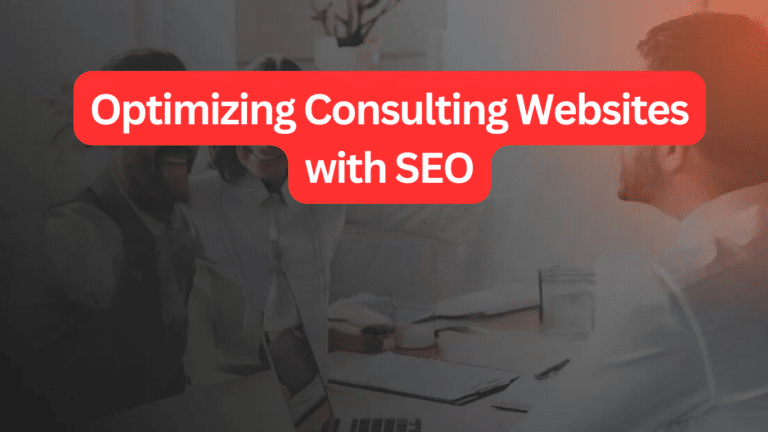The Complete Guide to Optimizing Consulting Websites with SEO
Search engine optimization (SEO) is crucial for any business looking to drive qualified traffic to their website. For consulting websites in particular, SEO can help attract potential new clients and establish thought leadership. Implementing effective SEO strategies takes time and effort, but pays off in the long run with increased visibility, website traffic, and conversions.
Guide to Optimizing Consulting Websites
Having an optimized website is crucial for driving new business and establishing thought leadership in the consulting industry. By improving your website’s search engine optimization (SEO), you can increase your visibility and attract more potential clients online.
In this comprehensive guide, we’ll cover the most important SEO strategies and best practices specifically for consulting websites. Whether you offer management consulting, IT consulting, HR consulting, or any other professional services, these tips will help improve your SEO and get your website found online.

Conduct Keyword Research
The foundation of any good SEO strategy is keyword research. You need to identify the main keywords and phrases that potential clients are searching for related to your services. For consulting websites, relevant keywords could include:
- IT services consultant
- Information Technology consultant
- Information Technology consulting services
- Consulting for Marketing
- Top Marketing consulting firms
Start by brainstorming a list of potential target keywords. You can use Google’s keyword planning tool to see monthly search volumes and filter by location. Focus on keywords with high search volume and low competition – these are terms you can realistically rank for.
Once you’ve compiled your keyword list, use Google Search Console to see which terms are already driving traffic to your site. Double down on optimizing for these proven high-value keywords. Add new target keywords that are relevant but not yet bringing traffic.
Optimize Website Pages for Target Keywords
With your list of target keywords, the next step is optimizing website pages around these terms. Each page should focus on a core topic and related keyword.
For example, your services page could target “[your service] consultant”, while individual service pages optimize for “[specific service] consulting”.
Follow on-page SEO best practices:
- Include keywords in title tags and headers (H1, H2 tags)
- Use keywords naturally in page content
- Include keywords in image file names and ALT text
- Create unique, SEO-optimized meta descriptions
Also ensure your website is built on a secure HTTPS connection and has a sitemap XML file defined.
Produce Optimized Blog Content
Blogging is powerful for SEO because it helps build keyword-focused pages that attract search traffic. Make sure your consulting website has a blog to publish timely content like:
- Thought leadership articles
- Expert advice and guides
- Case studies and client success stories
- Industry analysis and commentary
Optimize each post around a primary keyword, while also incorporating related secondary terms. Write compelling headlines that include keywords.
Link out to authoritative sources and internal service pages where relevant. Embed media like images, charts, and videos – include alt text!
Promote your new blog posts through social media and email newsletters to boost visibility. Over time, you’ll build domain authority as more quality content brings in organic traffic.
Conduct Local SEO to Rank in Map Pack
For location-based consulting services, optimizing for local SEO is hugely important. You want to rank in the map pack for searches like “[your service] consultant near me”.
Start by ensuring your Google My Business listing is completely filled out and verified. This acts as your local business profile.
Build local keywords into website content when possible. For example, “We offer [your service] consulting in [city, state].”
Local citations also help boost local SEO rankings. Manual submissions or citation-building services like Moz Local can publish your business name, address, and phone number across hundreds of directories, local data aggregators, and review sites.
More local citations and signals of physical presence will improve your local pack ranking and drive more calls, walk-ins, and location-based searches to your site.
Promote Your Consulting Website
Driving referral traffic from other reputable websites is a top SEO strategy. There are several ways to earn high-quality backlinks that point to your consulting site:
- Contribute guest posts to industry blogs and publications. Secure backlinks where possible.
- Comment on forums and threads within your field. Include a link to your site where relevant.
- Sponsor or speak at live industry events. Ensure your website is promoted.
- Request listings in well-ranked local business directories.
- Network with other consultants and mutually link to each other.
- Promote your new content and expertise on social media.
Focus on getting backlinks from authoritative websites in your industry. Also diversify link sources – don’t rely solely on one or two referrals sites. Quality over quantity applies here.
The more quality sites that link back to your consulting website, the bigger SEO boost you’ll see over time.
Monitor and Improve SEO Performance
After implementing SEO best practices and giving them time to take effect, the final step is tracking performance and refining your approach.
Use Google Analytics to monitor organic traffic to your website, as well as your rankings for target keywords. If you haven’t yet cracked the first page for priority terms, keep optimizing those pages.
Check Google Search Console for indexed pages, crawl errors, and manual penalties. Address any issues surfaced.
Build upon what’s working – produce more content around your highest traffic keywords and topics. Expand your backlink profile with additional guest posts and citations.
SEO is an ongoing process. Continually optimize existing content while also developing new pages, promoting your site, and monitoring results. By dedicating time to SEO specifically for your consulting website, you’ll notice significant growth in relevant organic traffic and new business over the long term.
Frequently Asked Question
1. What is SEO, and why is it important for consulting websites?
SEO stands for Search Engine Optimization, and it’s crucial for consulting websites because it helps improve their visibility on search engines like Google. This increased visibility can lead to more organic traffic and potential clients finding your services.
2. What are the primary SEO strategies for consulting websites?
The primary SEO strategies for consulting websites include keyword research, on-page optimization, content creation, link building, and local SEO. These tactics help improve your website’s search engine rankings and attract relevant visitors.
3. How can I perform effective keyword research for my consulting website?
Keyword research involves identifying relevant search terms that potential clients might use. You can use tools like Google Keyword Planner or SEMrush to find keywords, analyze competition, and choose the best ones for your content.
4. What is on-page optimization, and how can it benefit my consulting website’s SEO?
On-page optimization involves optimizing individual web pages to improve their search engine rankings. This includes optimizing meta titles, descriptions, headings, and ensuring that your content is high-quality, relevant, and valuable to your audience.
5. How can I create high-quality content for my consulting website that ranks well on search engines?
To create content that ranks well, focus on providing valuable, informative, and well-researched information. Use keywords naturally, format your content properly, and include multimedia elements like images and videos when relevant.
6. What is link building, and how does it affect SEO for consulting websites?
Link building is the process of acquiring high-quality backlinks from other reputable websites. These backlinks can improve your website’s authority and visibility in search results. Focus on earning backlinks through guest posting, partnerships, and creating shareable content.
7. Should I invest in local SEO for my consulting business?
Yes, local SEO is crucial for consulting websites, especially if you have a physical location or offer services in specific geographic areas. It helps you appear in local search results and attracts nearby clients.
8. How long does it take to see results from SEO efforts for a consulting website?
SEO is a long-term strategy, and it may take several months to see significant results. The timeline can vary based on factors like your competition, the quality of your SEO efforts, and the industry you’re in.
9. What tools and resources can help me with my consulting website’s SEO?
Some useful SEO tools and resources include Google Analytics, Google Search Console, Moz, Ahrefs, Yoast SEO (for WordPress users), and various online courses and blogs dedicated to SEO best practices.
10. Do I need to continuously update and optimize my consulting website for SEO?
Yes, SEO is an ongoing process. Search engines frequently update their algorithms, and your competitors are also working on their SEO strategies. Regularly update and optimize your website to maintain and improve your rankings.
Conclusion
Implementing SEO best practices tailored to the consulting space takes time, but delivers immense value. Follow this comprehensive guide to optimize your website content, improve local rankings, earn high-quality backlinks, and monitor your performance. SEO success requires consistency – commit to leveraging these strategies over the months and years ahead. Your consulting website will become more visible, trusted, and authoritative through effective search engine optimization.















